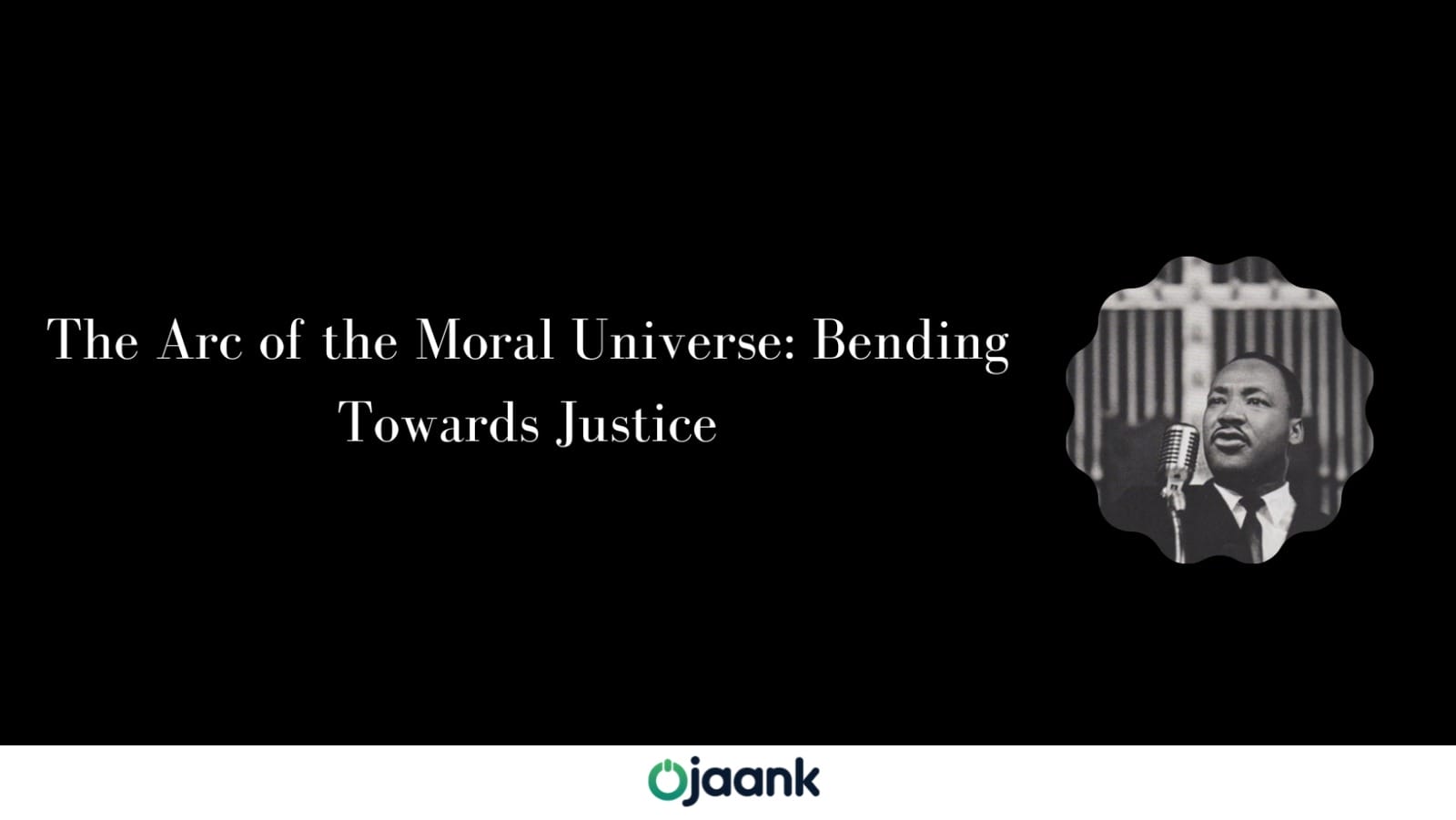The Arc of the Moral Universe: Bending Towards Justice

In the annals of history, the phrase "The arc of the moral universe is long, but it bends towards justice" stands as a testament to the enduring hope for a better world. This phrase, often attributed to Martin Luther King Jr., encapsulates the idea that even in the face of seemingly insurmountable challenges, the forces of justice, equality, and righteousness eventually prevail. This essay explores the profound truth behind this sentiment, drawing upon real-life examples from India to illustrate how the arc of the moral universe does indeed bend towards justice.
One of the most significant instances of the arc of moral universe bending towards justice in India is the long-fought struggle for independence from British colonial rule. The Indian freedom movement, led by visionaries like Mahatma Gandhi, exemplified the relentless pursuit of justice and equality. Gandhi's nonviolent resistance, including the Salt March and civil disobedience campaigns, proved that steadfast determination and moral conviction can overcome even the most entrenched powers. Ultimately, India's hard-fought battle against colonial oppression culminated in its independence in 1947, showcasing that justice prevails when the will of the people remains unyielding.
The arc of moral universe bending towards justice is vividly visible in India's ongoing efforts towards women's empowerment. For decades, women in India faced systemic discrimination and gender-based violence. However, the tides have been changing. Laws protecting women's rights have been enacted, and awareness campaigns against gender-based violence have gained momentum. The "Nirbhaya" case, where a brutal gang rape sparked nationwide outrage, led to legislative reforms and a renewed focus on gender justice. The rise of women leaders in various fields, such as politics, science, and sports, showcases the gradual but definite progress towards a more just and equitable society.
In recent years, India has also made remarkable strides towards recognizing and affirming the rights of the LGBTQ+ community. The legal battle around Section 377 of the Indian Penal Code, which criminalized homosexuality, spanned decades. The landmark judgment of the Supreme Court in 2018, decriminalizing consensual same-sex relations, was a watershed moment. This legal victory marked a significant step towards bending the arc of the moral universe towards justice, acknowledging the rights and dignity of all individuals, regardless of their sexual orientation.
Caste-based discrimination has been a deeply ingrained issue in India's social fabric for centuries. However, concerted efforts have been made to address this pervasive injustice. Initiatives like affirmative action policies, such as reservations in education and employment for marginalized castes, aim to rectify historical imbalances. Additionally, grassroots movements and advocacy groups are working tirelessly to challenge the deeply rooted prejudices associated with caste hierarchies. While the journey is far from over, the consistent push for social justice is a testament to the gradual bending of the arc towards a more egalitarian society.
The pursuit of environmental justice and sustainability is another arena where India is witnessing the bending of the moral universe towards justice. The impacts of climate change and environmental degradation are affecting vulnerable communities disproportionately. In response, India has taken significant steps to transition towards renewable energy sources and implement conservation measures. The International Solar Alliance, launched by India, exemplifies the commitment to global environmental well-being. As the world recognizes the urgency of addressing environmental challenges, India's efforts reflect the growing inclination towards a just and sustainable future.
Access to quality education has long been a concern in India, especially for marginalized communities. However, various initiatives have emerged to bridge this gap. The Right to Education Act, which guarantees free and compulsory education for children aged 6 to 14, is a significant step towards equalizing educational opportunities. Moreover, the proliferation of online education platforms has enabled access to learning even in remote areas. The empowerment that education brings fosters a sense of justice by providing individuals with the tools to uplift themselves and their communities.
The COVID-19 pandemic underscored the importance of healthcare equity and access. India's response to the pandemic, while facing challenges, showcased efforts to ensure medical care reaches all sections of society. Vaccination campaigns, though complex due to the country's vast population, highlighted the commitment to bending the arc of the moral universe towards health justice. The crisis prompted conversations about strengthening healthcare infrastructure and addressing inequalities in healthcare delivery.
In conclusion, the phrase "The arc of the moral universe is long, but it bends towards justice" is a profound reminder that despite the challenges that persist, progress towards a more just and equitable society is inevitable. India, with its rich tapestry of struggles and triumphs, exemplifies this truth through its history of fighting against colonial oppression, promoting women's empowerment, advancing LGBTQ+ rights, addressing caste-based discrimination, advocating for environmental stewardship, ensuring access to education, and striving for healthcare equity. These real-life examples illuminate the transformative power of human agency, resilience, and unwavering commitment to principles of justice and equality. As India continues on its journey, the bends in the arc of its moral universe stand as beacons of hope for a brighter and more just future.